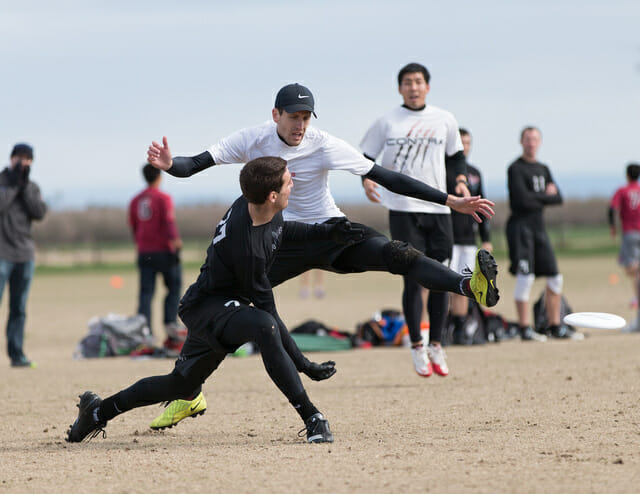March 4, 2014 by Charlie Eisenhood in News with 22 comments

SAN FRANCISCO — North Carolina defended their number one overall ranking this weekend with a poised and at times dominant performance on Sunday to win the 2014 Stanford Invite title.
After a lightning delay stalled the finals for nearly an hour, UNC was clinical in their 15-11 victory over Pittsburgh, giving up just a single break late in the contest and generally outmatching the team that had handed them their only loss of the season just a day before.
The difference wasn’t just the sudden lack of wind in the finals after an extremely windy Saturday. North Carolina was focused and strategically much cleaner throughout the day on Sunday.
“It was just business,” said UNC coach Mike DeNardis. “The energy was really good. We really wanted to win.”
In some ways, the loss to Pittsburgh in pool play may have been a blessing in disguise. The team has rarely faced adversity in game situations this season and was forced to then play an elimination contest against Oregon in the prequarters. After falling behind 6-3 after Oregon scored a pair of breaks, UNC — unlike last year at the Stanford Invite where they crumbled in the same round — turned on the jets and eventually winning 15-12.
“I think the loss that we took kind of took the burden off of people’s shoulders,” said DeNardis, pointing out that it made Sunday easier.
The final was not the most interesting — or the most challenging — game of the day.
Play began on Sunday with a highly anticipated matchup between UNC and #2 ranked Colorado, a team that many believed would win the Invite. Although the final score (14-13) was close, it does not reveal how dominant UNC was at times in the game.
With top defender and key handler Ben Snell playing nearly every point and often taking the matchup against Colorado’s Jimmy Mickle, UNC used excellent downfield defense to force Colorado into a number of turnovers on reset looks in the first half. Snell and Jon Nethercutt worked together in the backfield to pace the offense and carry the team to an 8-4 halftime lead that, if not for a handful of poor decisions near the upwind goal line, could have been bigger.
“I was really happy with how we came out Sunday morning,” said DeNardis.
A Colorado junk defense baited some bad throws in the second half and Mamabird took advantage to close the gap to one. They had multiple chances to break upwind down the stretch — including two to tie the game at 12-12 and force double game point — but failed to capitalize. Excellent defensive pressure from UNC kept Colorado off balance as miscommunications led to quick turnovers.
DeNardis thought that his team could have won the game by a wide margin, but hurt themselves by not adjusting well to the wind and the Colorado zone looks. He did, however, say that Colorado was an extremely talented team and one that he expects they could see again.
“I think Colorado is the closest match to us right now, physically, in the country,” he said.
UNC may have also met a team with the athletes to challenge them in the semifinals against Florida State. After a back and forth physical battle in increasing wind, UNC broke upwind and then downwind late to take a 12-10 lead. FSU responded with an offensive hold and then a critical upwind break to tie the game as the hard cap loomed. But UNC didn’t blink, working methodically against the wind to put it into the endzone and avoiding what had happened so many times before — giving up the downwind break.
They would go on to score the ensuing downwind point and close out the contest 14-13 after hard cap rendered the final point meaningless.
“Despite other teams making runs all day on Sunday, we didn’t waver,” said DeNardis, who was pleased with his team’s mental fortitude. “None of these pressure situations are bothering us like they did last year.”
Like at the Queen City Tune Up, contributions come from across the roster. O-line cutter Vikram Sethuraman was a standout in the finals, but was less of a factor earlier in the day. Lefty handler Jimmy Zuraw saw a lot of playing time to utilize his mark breaking ability.
But it was Snell and Nethercutt that really powered the team. Every time the team needed an important throw or simply patient resets, the two veteran handlers were there to take the reins. Their confidence is obvious and clearly an important part of the team’s success so far this season.
Despite the blemish of the team’s first loss, UNC made a statement this weekend: they are the team to beat this season. Any questions about their ability to stand up to elite competition have been laid to rest.
DeNardis remains unsatisfied.
“I don’t think we’ve played the best ultimate we can play, yet,” he said.